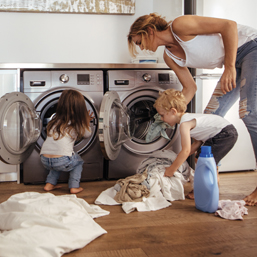
We have all been there: the house is a mess, there are toys everywhere, dishes piling up, laundry hampers overflowing…
At this point, it’s just faster for you to do all of the work yourself than to ask your kids for help and hear the endless, “why do we have to do this?” and “it’s too hard!” protests.
However, deep down you know that your children need to learn the skills and responsibilities of cleaning on their own to become self-sufficient adults.
So how do you get them to take part in the housework without whining, complaining, and claiming you are “the worst!”?
Start small
I mean this literally in two ways. Start getting your children to help around the house in little ways when they are small. If you are doing the dishes, have your toddler rinse the clean dishes or dry them with a towel. Let them “fold” laundry and put it away.
Have them throw away their own trash. Allow them to dust with a duster (they find this one particularly fun).
Make sure to keep it manageable for small hands to help by having known designated spots for items you ask them to put away. Ensure that they can reach all of the things they need to help out. One of the best parts of getting a toddler to help with chores is that they don’t need rewards to do so. Spending the time with you and taking part in the “grown up” chore is all the fun they need. Don’t forget to make it extra special for them by praising what they are doing. (This is true even if it is not particularly efficient and it makes the chore more work for you! It will all pay off in the long run).
Step by step
Some of the complaining that often comes with asking an older child to help around the house may stem from the fact that they don’t really know how to help and don’t want to admit it.
When you ask a child to do something, it can be useful to break it down into manageable, memorable steps. This can help a child be more willing to do the task and improve their confidence.
Taking out the trash can be broken into:
Start their laundry duty with folding and putting away towels and face cloths. Then move on to add clothes, lastly add matching and folding socks.
Mastering each skill in a manageable way sets them up for success and means they are more likely to help again.
Tag team
Children of all ages are going to be more willing to take part in chores if you do them together. I know what you are thinking. “Wrong! My teen doesn’t want me anywhere near them – ever!”
They may tell you that, or show it in their body language, but it isn’t necessarily true. Taking part in household chores together allows for a sense of teamwork and bonding.
Rather than looking at it as “these are my chores and these are yours,” try working on each project together. It will take less time and provides a chance to talk about what is going on in their lives.
If you pepper them with questions about their day on the way home from school, you will likely get met with “it was fine” or “I don’t know,” but if you tell them something frustrating that happened to you while you wash and dry the dishes together, they might reveal something similar that recently happened to them.
You would be surprised how many big questions get asked during laundry duty!
Make it fun
Another aspect that rings true for all ages is the fact that making chores fun increases the chance that your child will want to take part.
Why not crank their favorite tunes while you clean?
Use chore charts to get them motivated. There are hundreds of free printable options online and you can come up with the rewards (if you choose to use them) together.
Change their task from arduous to adventurous by making it into a game. See who can clean up the toys the fastest, or who can get the most socks in the drawer by throwing them from a certain distance away.
Let older children come up with the games themselves or work with siblings for a prize.
Reward
Although this can be a controversial topic, there is no denying that a crucial piece of getting children to do chores can be incentivizing them with a reward of some kind.
As mentioned, for young kids, the reward can simply be the chance to put away the adult dishes.
As they get older, the reward may be adding the sticker on the chore chart or the small treat they get after collecting five stickers.
Older children’s rewards may be privileges (you can go out and play with your friends after you’ve cleaned your room) or an allowance. It is important, if you choose to go the allowance route, that you only give the money if the agreed upon chores are completed to your satisfaction.
Material rewards aside, never underestimate the power of a “thank you for taking out the garbage without even being asked” and “you did a great job cleaning the windows, I really appreciate the time you took.”
Praise and encouragement go a long way to incentivising someone to do something again.
The benefits of children doing chores are proven and plentiful. They include developing motor skills, improved self-esteem and self-worth, work ethic, learning responsibility, and many more.
In short, teaching your children how to do chores sets them up for a more successful and happier life. CCM
See our related articles:
Calgary’s Child Magazine © 2025 Calgary’s Child